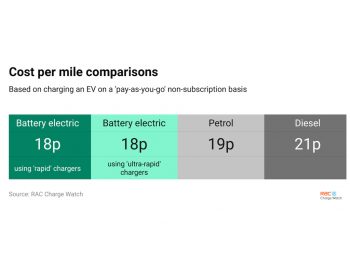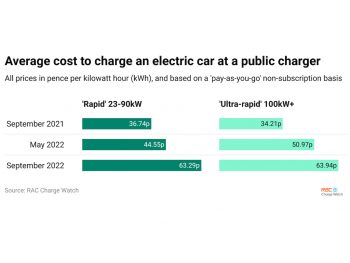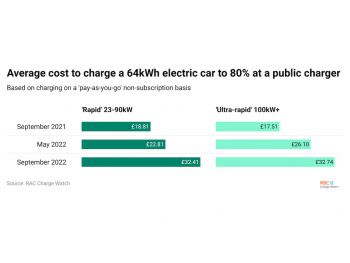Public rapid charging costs up 42% in four months
Rapid charging rates at public chargers have increased by 42% – or 18.75p per kilowatt hour – since May, bringing the cost per mile perilously close to petrol and diesel cars.

The rise in public charging costs brings the cost-per-mile figure for an EV close to ICE vehicles on a pay-as-you-go basis
That’s up by nearly £10 (£9.60) since May and £13.59 compared to a year ago, according to the RAC, on the back of spiralling energy prices.
Charges for ultra-rapid chargers – with a power output of more than 100kW – have increased by a quarter (25%), or 12.97p, since May, to an average 63.94p per kilowatt hour. This puts the cost of an 80% charge at £32.74, up from £26.10 in May (25% increase) and from £17.51 in September 2021 (87% increase).
The increased costs mean a driver exclusively using a rapid or ultra-rapid charger on the public network will now pay around 18p per mile for electricity, up from an average of 13p per litre in May. This compares to 19p per mile for a petrol car and 21p per mile for a diesel, based on someone driving at an average of 40 miles to the gallon.

Charges for rapid chargers are up by 42% since May and 25% for ultra-rapid chargers
The RAC points out that many current electric car drivers will predominantly charge at home where electricity is cheaper – under the Energy Price Guarantee that takes effect next weekend, the cost per mile for an average-sized EV driven reasonably efficiently is around 9p and the cost to charge a car to 80% at home will be £17.87.
But such a huge price gap between home and public charging highlights the hefty premium that drivers who depend on the charging network, including those who don’t have driveways and can’t charge at home, have to pay to run electric cars.
And it could deter drivers from going electric.
While the Government’s Energy Bill Relief Scheme announced last week should help prevent charging costs from spiralling still further, drivers using public charging still pay 20% in VAT for electricity they buy, compared to charging at home where it’s just 5%.
The RAC has reiterated FairCharge campaign’s call for both rates to be set at 5%, which would reduce the cost of an 80% rapid charge by 7.91p to 55.38p per kWh, and an ultra-rapid charge by 7.99p to 55.95p per kWh and would not unfairly penalise those drivers who can’t charge their cars at home

The RAC reiterated FairCharge campaign’s call for fairer pricing
RAC EV spokesperson Simon Williams said: “Last week, charge point operators got behind the RAC-backed FairCharge campaign in calling for the Government to end the inequity that exists between drivers who can charge at home and those that cannot, by cutting the 20% VAT charged on electricity at public chargers to match the 5% domestic rate. The Government needs to redouble its efforts in helping drivers to go electric if it is to meet its own net-zero transport objectives and levelling the public and domestic electricity VAT rates would show it is serious about doing so at a time when household budgets are getting ever tighter.”
Quentin Willson, founder of the FairCharge campaign, said: “With electricity costs up by an average of 140% on last year and the Government’s divisive VAT levy of 20% on public charging, EV adoption is under threat. This government needs to act on charging costs, cap rises on public chargers, lower VAT and support charge point operators to build infrastructure. If they don’t, all those years of promises of a zero-emission future, clean air and energy independence will have come to nothing.”
Commenting on the research, Tanya Sinclair, senior director, policy, Europe at ChargePoint: “While this is a headline consumers will be concerned to hear, there are a few things for them to consider. Firstly, for most drivers, the majority of charging takes place at work or home where costs are considerably cheaper. DC Fast Charge, which is becoming more expensive due to the energy crisis, is a small part of the equation in EV charging. It only plays an important role when people drive beyond the range of their vehicle and need to be able to charge their EV quickly.
“90% of the time people charge their vehicles from home or work, which is much more cost effective than DC Fast charging. We are at an important moment in the move to EVs, making it crucial for both industry and government to work together to help increase adoption and bring prices down. We encourage the Government to continue developing forward-thinking policies to help the UK reach its 2030 target of ending the sale of petrol and diesel cars, like the ZEV mandate and the requirement for charging operators to roam (be interoperable) with one another.”
Public charging costs compared:
Average cost to charge per kilowatt hour, by charger speed
| ‘Rapid’
23-90kW |
‘Ultra-rapid’
100kW+ |
|
| Sep-21 | 36.74p | 34.21p |
| May-22 | 44.55p | 50.97p |
| Sep-22 | 63.29p | 63.94p |
| Change May to Sep | +18.75p (+21%) | +12.97p (+49%) |
Average cost to charge a 64kWh car to 80%, by charger speed
| ‘Rapid’
23-90kW |
‘Ultra-rapid’
100kW+ |
|
| Sep-21 | £18.81 | £17.51 |
| May-22 | £22.81 | £26.10 |
| Sep-22 | £32.41 | £32.74 |
| Change May to Sep | +£9.60 | +£6.64 |












